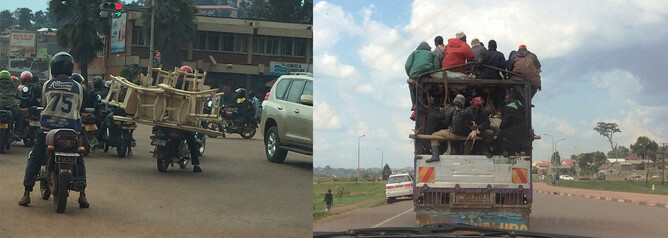My husband Calvin and I are basically a melting pot of cultures. Our little one, Selah Serese, is 2 years old and she does life with us. There are just somethings that are normal to her: we never really have a five-minute drive anywhere without traffic or some sort of traffic situation and to her it is normal. She sits at the back and says, ”Yeah boda” (motorcycle used for transport); she sees the cows cross the road and says, “Moo Cow”. To our two-year-old it is normal to go for a walk and look at the chickens, goats and cows from the corner of where we live—that is her version of a walk in the park. She loves it! And some days during COVID, as Papa comes back from work or is heading out, it is quite normal for her to sit with him and have an imaginary drive in the car, when you can’t really venture outside.
She has mastered three accents. As her Mama I can hear how she switches between accents as she speaks with different people in our world. The Lord also teaches Cal and I so much through the eyes of our daughter; differences intrigue her and she enjoys observing different things. She loves learning and asking why things are different, and her Papa does an awesome job explaining things to her, it is really fun to watch.
I have had the privilege of being of many nations, and I do consider that a privilege, but sometimes it has left me in a funny situation or two. Well, will talk about the funny side later… (It goes a bit like “Where are you really from?”) I am of Indian – Sri Lankan origin and was born and raised in Saudi Arabia. I have a deep love and appreciation for each of the cultures I grew up in, and the many others the Lord has allowed me to pass through. I was a short-term missionary in Fiji and that led me to Africa. I came through Ethiopia to Uganda, went back to Ethiopia for short-term work, then returned to Uganda where the Lord called me to full-time ministry in 2008. Each place the Lord has taken me has allowed me to grow and become a better person, especially in the area of cross-cultural living. My husband Calvin is Ugandan and comes from the Eastern part of the country, Soroti. Kampala has been his home since 1995. I have lived here since 2008. Kampala has really evolved as I start my 13th year here in November.
When Calvin and I were newlyweds, we would go out for a coffee on our day off and we always had people staring at us because of our origins. One day Cal had to go and talk to a manger of a cafe and request their staff stop staring at us, as it was getting quite uncomfortable. Fast-forward eight years and cross-cultural couples and families are getting more common.
Differences draw a lot of attention. We often stop to wonder, “How strange or how weird?” We may not be used to a way of doing something, but fast forward and it all becomes a new normal or we find it amazing and we adapt. When I first moved to Kampala I had to use a 14-seater van called a matatu for transport, and there are always more than 14 people in those vehicles along with shopping—which may include a live chicken in the boot. If it isn’t secured well on a long ride the chook can make its way forward—you learn to duck pretty fast! The vans were generally quite suffocating, especially in the early mornings as the commuters often believed that cool morning fresh air gave you not only pneumonia but also malaria or the flu. After my first few uncomfortable rides I got used to it. I also appreciated how my colleagues got to work and how workers got to the trade everyday.
One of the things I have personally faced is the aspect of trust; you have to earn someone’s trust before they can share anything with you, and I think that is fair. I am someone who walked into their world and I need to be known and accepted before I can be accepted into their world. This journey can take a few weeks to years. I remember being asked if I was here on holiday to visit the national parks and other tourist attractions, because most people would say “This is a tough place if you are not used to this way of life. Will you survive?” The truth is to this day some things still take me by surprise, but it is new and it works out.
Being different also intrigues people. “Why did you come here? What is your mission?”—among other often quite personal questions. It can get uncomfortable sometimes being asked so many questions, but it also creates a great avenue for a relationship to grow.
Sometimes where you come from dictates how you are treated—here I get to my funny story. On my first visit to Ethiopia, I was to meet by my host at the airport. The flight came in close to 10 at night, and travelling on my own I did wonder how the airport pickup was going to go, but as I had no other option it was all good. I arrived at the allocated time and cleared customs and immigration, which was a long process as you waited for your passport to come with the ‘visa on arrival’ sticker. I had a few heads pop out to check who I was, and with a maiden name like mine (Mahimaidass), it kind of made their linguistic day! As I got my visa I was asked numerous times basically why I looked the way I did! To the immigration folk I looked Ethiopian. With the visa in my passport I dashed for the giant automatic sliding doors (they weren’t sliding, as the passengers pushed it open).
I walked into an arrival area; I began to look for my name on a little piece of paper being held up. Later I found out if you had the name up too early, someone else would copy the name and pick you up instead—not good. So just as people started coming out, the name card was quickly popped up and back down. I walked around for about an hour. And yes, this was before airport Wi-Fi (I mean free, working Wi-Fi). As the waiting area grew smaller and smaller, I took it on myself at close to midnight to walk around a bit more and perhaps try the eye contact strategy. My maiden name was a task in its own way so if they have 7 alphabets arranged in any order, you go with it (7 alphabets forming a 11-letter name, not easy to copy or spell or really even say out loud). I was approached by a man in his mid-30s who showed me my name on a tiny piece of paper and said ”Is this you?” I checked the name and it was close enough! So they picked me up and off we went, I was so drained. I had just finished a three-week medical camp in Uganda and I was really looking forward to a smoother arrival, but I was found. I asked the man if he wouldn’t mind calling their contact person who booked me in the US office. Again, no Wi-Fi, so couldn’t access emails. He was a kind volunteer who wasn’t given my allowances that I sent to their US office, and he used all his phone credit plus the driver’s phone to check that he had picked up the right person.
He was a lovely man and so was the driver. They both had the same name (maybe they just said call us one name “Alayu”). He said to me “I am sorry, but I did notice when you came out, but usually people like you come to find their family or visit with family and friends.” He was referring to my colour, and the driver said ”She is definitely Ethiopian”—so both said, based on what origin they thought I came from, there was no way I was a missionary coming to serve at the All Boys Orphanage, which was a 15-hour drive from Addis Ababa!
He said I have never met a colored Australian: “They are all white—how come you no Ethiopian.” I did take time to explain where I came from but then both had a smile and said “Well we did think that, but you didn’t look like the business kind. Ah, you Ethiopian!”
When you travel the world there are so many perceptions that people have. But the real question is: What are the perceptions that God has placed for you to break in that setting?
When I came to Uganda in 2008, I was introduced as the person coming in to get the medical laboratories and all other infectious disease issues sorted. In other words, I was staff, which means I got pay and staff benefits. Apart from the excitement of the person who introduced me, I wasn’t staff—they got my job description right, but not my capacity. I got an allowance, a very humble allowance, which I was grateful for. The allowance was a roof over my head and an amount that paid for some groceries. Shortly after my introduction in the ministry, I remember meeting someone from the accounts department. She said “So, you are Shirley from the medical department. I always wanted to know who you were and why you got such an allowance from the ministry. You are a volunteer and you get staff benefits of housing—why?” I was shocked and obviously it showed. She continued, “I say that because, after all, you are just an Indian who comes from Australia. Your people come here to do business and take money away from the locals.” I didn’t say much after that—and obviously the conversation ended. A rather strange conversation, but she felt I got a lot more than I deserved based on my ethnic origin.
I didn’t react. There was not really a whole lot to say after such a statement, but over the years it was pretty clear I came to serve and that was it. Jesus does not call us by the colour of our skin or our ethnic origin or where we come from—He calls us by the purpose He created us for. When you stand your ‘God ground’, perceptions change. Just like in any relationship, our differences are meant to complement and make the name of Jesus even sweeter to those around us.
‘Serve’ is a very important word here. Serve is going above and beyond to help someone, regardless. Serve is also when we are called to serve someone who doesn’t want us to serve them based on their own perceptions and biases. A wise person once said to me, “Just because you have come to serve the people of this nation does not mean they are going to accept you for you.” And there are many stories in the Bible that show us that as well.
Celebrate the differences, and accept people for who they are. Serve the people God has called you to serve. You may never find that special friend you had back home, or even that small group that cared for you and helped you grow so much, but God has got you. And where He has called you He will provide for you and keep you.
When a season changes, it happens pretty fast and often with no prior notice. We all have chapters in our lives that took us long to get planted into, but we grew to love and cherish every step of the journey. The Lord placed us there and we grew and we continue to serve.
The Oules in Uganda


